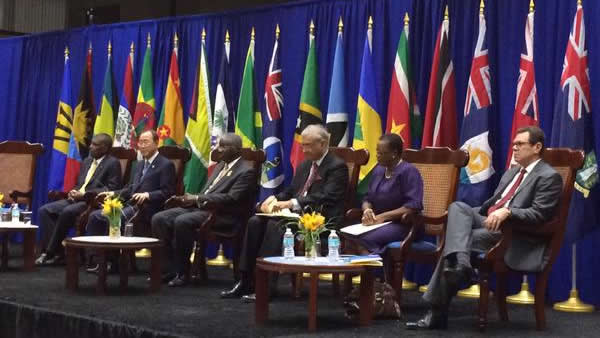Caribbean States 'Lighting Path' to Sustainable Future, Says UN Chief in Barbados
Secretary-General Ban Ki-moon took part in a high-level symposium focused on sustainable development in the Caribbean.

This is a year for global action, with international community in the final stretch of preparing a transformative post-2015 agenda for sustainable development that will be agreed in New York in September, United Nations Secretary-General Ban Ki-moon declared in Bridgetown, where, two decades ago, the Barbados Programme of Action was adopted to tackle vulnerabilities facing small islands.
“I want to salute Caribbean countries for taking on ambitious renewable energy targets. By 2020, for example, Barbados will be one of the world's top five leading users of solar energy on a per capita basis. You are lighting the path to the future,” Secretary-General Ban Ki-moon said during a high-level symposium focused on sustainable development in the Caribbean.
This meeting was among the UN chief's first stops in Barbados, where later today he is expected to make opening remarks to the 2015 Caribbean Community (CARICOM) Summit, and where tomorrow, he will, among others, hold an interactive dialogue at the University of the West Indies.
“Twenty years ago, this very building was the site of the First Global Conference on Small Island Developing States that adopted the Barbados Programme of Action – the first compact between this group and the international community,” he noticed.
For small island developing States, Mr. Ban added, this space is “hallowed ground.”
Encouraged by the presence of so many leaders of governments, regional and international organizations, the private sector, academia, and civil society, the Secretary-General highlighted the “continuing Caribbean commitment to put our world on a safer, more sustainable and equitable pathway,” a few days from the Third International Conference on Financing for Development in Addis Ababa, Ethiopia.
“As leaders of some of the most vulnerable countries in the world, you don't need to be told that our planet is at grave risk. You are on the climate frontlines. You see it every day,” he continued.
Convinced that sustainable development and climate change are “two sides of the same coin,” the UN top official went on to say that this generation could be the first to end global poverty, and the last to prevent the worst impacts of global warming “before it is too late.”
To get there, he underlined, the international community must make sure that the proposed sustainable development goals (SDGs) are “focused, financed and followed up – with real targets, real money and a real determination to achieve them.”
Considering these goals as a sort of a “to-do list for people and the planet”, Mr. Ban emphasized that it will take partnerships to make that happen. In that regard, he said, the Third International Conference on Small Islands Developing States in Samoa last year laid a pathway for collective action and success within the post-2015 development agenda.
But, as the world prepares for a new sustainability framework and the sustainable development goals, a number of critical partnership areas must be strengthened, in particular the need for capacity building; financing; access to technology; and improved data collection and statistics.
Member States also must continue working together to link the global agenda to regional agendas and to deepen regional integration and to address the “unique needs and vulnerabilities” of small island developing states and middle-income countries, such as the debt challenge.
“And we need to keep forging the way forward towards a low-carbon, climate-resilient development pathway that will benefit both people and the planet,” the Secretary-General underlined.
He gave the assurance that, through the Green Climate Fund, and in working with world leaders, he will continue to insist that small islands and least developed countries are top funding priorities.
“My main message to you is to remain fully engaged and keep working with us to strengthen our partnership during this vital year for humanity. Together, we can build a better, more sustainable world, for all.”
Later, in an address to an event on ending violence against women, the Secretary-General said the Caribbean has among the highest rates of sexual assault in the world. Three Caribbean countries are in the global top ten for recorded rapes.
Moreover, he noted that in the eastern Caribbean, UNICEF estimates that child sexual abuse rates are between 20 and 45 per cent – meaning at least one in five precious children are affected. Most are girls who have no choice but to live close to their attacker.
“They desperately need our help. Too many women are afraid to seek help. One study showed that up to two thirds of all victims suffer without ever reporting the crime. I am outraged by this. Shame belongs to the perpetrators – not the victims. We have to change mindsets – especially among men,” declared the UN chief.
In that light, he said he was proud to be the first man to sign onto the UN's HeForShecampaign, and he invited more men to take the HeForShe pledge.
“I encourage you to join UNICEF's End Violence global campaign. And every day, I count on all of you to work for true equality.”
In the margins of the 36th meeting of the Conference of Heads of Government of the Caribbean Community in Barbados, the Secretary-General met with Prime Minister Freundel Stuart, and Minister for Foreign Affairs and Foreign Trade, Maxine McClean, of Barbados, a country he congratulated for its upcoming leadership of CARICOM.
Related content
Secretary-General's opening remarks at the Caribbean Sustainable Development High-Level Symposium
By Ban Ki-moon, United Nations Secretary-General.
Subregional headquarter(s) and office(s)
Country(ies)
- Caribbean
Contact
Public Information Unit
- prensa@cepal.org
- (56 2) 2210 2040